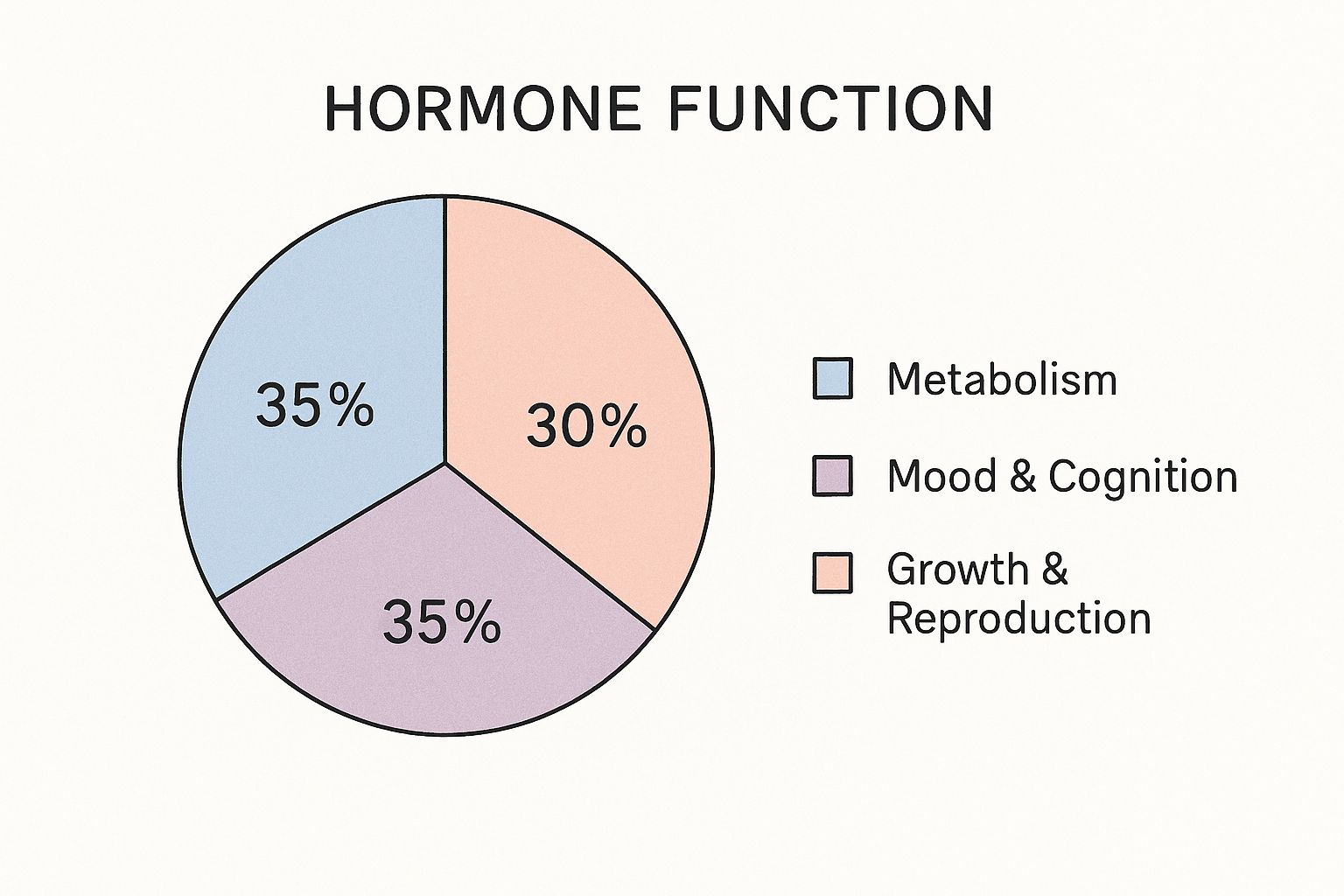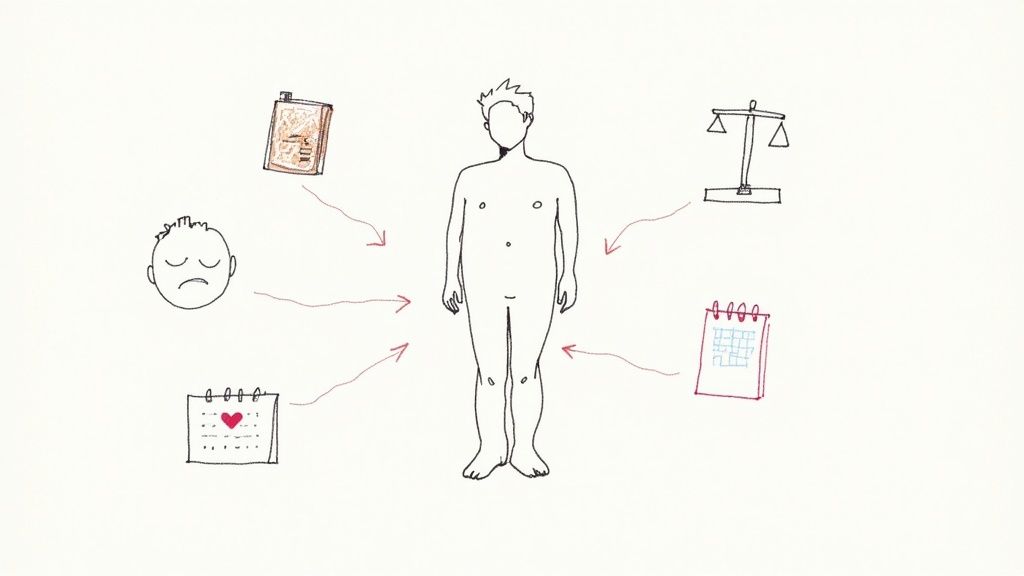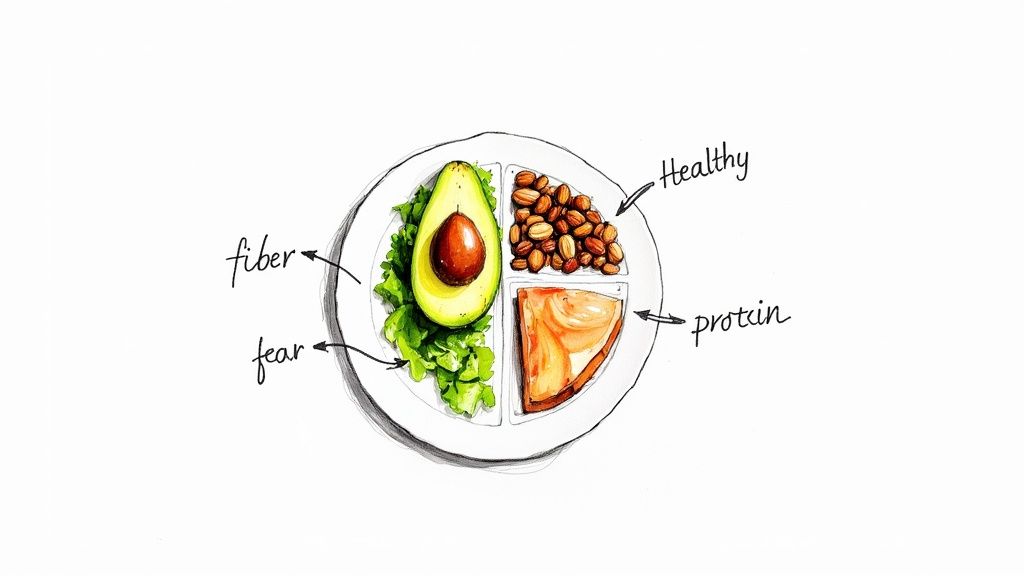Achieving natural hormonal balance is like conducting an orchestra. For a beautiful symphony of health and vitality, every instrument must play in harmony. This delicate balance, led by your body's chemical messengers, is the foundation of your overall well-being. Understanding how it works is the first step toward taking control.
Demystifying Your Body's Chemical Messengers
Think of hormones as tiny, powerful couriers in your bloodstream, delivering vital instructions to your organs and tissues. This complex communication network, your endocrine system, manages everything from your mood and energy levels to sleep and digestion.
True natural hormonal balance isn't a static state; it's a dynamic process of keeping these hormonal signals finely tuned. When they're in sync, you feel energised, focused, and ready for anything. But if one messenger is off-key, the whole system can feel out of tune, leaving you tired, irritable, or not quite yourself.
The Core Functions of Your Hormones
Hormones are the master regulators of three critical areas of your health. Their influence is massive, touching everything from daily energy to long-term physical development.
- Metabolism and Energy: Hormones like insulin and those from your thyroid gland regulate how your body turns food into fuel, manages blood sugar, and maintains a stable weight.
- Mood and Cognition: Sex hormones (oestrogen and testosterone) and your main stress hormone (cortisol) have a huge say in your mood, concentration, and ability to cope with daily pressures.
- Growth and Reproduction: These messengers guide you through life's biggest stages, regulating everything from menstrual cycles and fertility to physical growth.
This chart shows how these responsibilities are shared, highlighting the profound impact hormones have across your system.

As you can see, no single function gets all the attention; your metabolism, mood, and reproductive health are all equally vital pieces of the hormonal puzzle.
Think of it this way: a hormonal imbalance isn't so much a diagnosis as it is a conversation. It's your body's way of signalling that it needs more support, whether that's through better food, a different lifestyle, or smarter stress management.
Providing that support doesn't require drastic changes. It's about making small, consistent choices that help your body’s orchestra play in harmony. By understanding what your hormones do, you can start giving them what they need to thrive. This is the foundational knowledge that empowers you to take the next practical steps.
Recognising Your Body's Hormonal Signals
Your body is constantly communicating with you. Learning to read its signals is a massive step towards achieving natural hormonal balance. Instead of seeing symptoms as problems, view them as valuable intel your body is sending to tell you what it needs.

Often, these signals fall into clear categories, making them easier to spot. By noticing patterns in your mood, appearance, or energy levels, you can connect the dots and understand the bigger picture. This puts you back in the driver's seat, ready to respond with supportive actions.
To make this easier, here are some of the most common signs. Take a look at the table below and see if any of these signals sound familiar.
Common Signals of Hormonal Imbalance
| Symptom Category | Common Signals to Watch For |
|---|---|
| Mood & Energy | Persistent fatigue, irritability, anxiety, mood swings, trouble sleeping |
| Physical Appearance | Unexplained weight gain (especially around the middle), acne, dry skin, hair thinning or loss |
| Metabolism & Digestion | Cravings for sugar, bloating, digestive issues, changes in appetite |
| Reproductive Health | Irregular or heavy periods, low libido, PMS symptoms, fertility challenges |
This isn't a diagnostic tool, but it's a great starting point for becoming more aware of what your body might be telling you. Let's dig into a few of these areas a bit deeper.
Mood and Energy Shifts
One of the first places hormonal issues show up is in your energy levels and emotional state. A classic sign is persistent fatigue that a good night's sleep just doesn't fix. This is a bone-deep exhaustion that can make getting through the day feel like a challenge. If this rings a bell, you might want to look into the signs of adrenal fatigue.
This fatigue often goes hand-in-hand with mood shifts. You might find yourself feeling more irritable, anxious, or emotionally fragile. These changes aren't a reflection of your character; they are often a direct result of hormones like cortisol and oestrogen being out of sync, which affects your brain chemistry and your ability to cope with stress.
Physical Changes You Can See and Feel
Your body can also give you visible clues that your hormones need attention. Unexplained weight gain, especially around your middle, can be a sign that your metabolism-regulating hormones—like insulin or thyroid hormones—aren't working as they should be.
Other common physical signs are changes to your skin and hair. Perhaps you're dealing with stubborn acne, dry skin, or you've noticed your hair is thinning or falling out more than usual. These outward signs often mirror an internal imbalance, particularly with androgens and thyroid hormones, which are key players in skin and hair health.
Paying attention to these signals is like learning your body's unique language. Each symptom is a word, and by listening carefully, you can understand the full message and respond with the care and support your system is asking for.
Cycle and Libido Fluctuations
For many, shifts in the menstrual cycle are one of the clearest red flags for a hormonal imbalance. Irregular, unusually heavy, or missed periods can all point towards a disconnect between oestrogen and progesterone, the two main hormones running the show.
Similarly, a noticeable drop in your sex drive, or libido, is a very common signal. This is often tied to dips in testosterone and oestrogen levels. While libido is a complex thing with many influences, a persistent low desire can be a meaningful clue that your hormonal orchestra is a little out of tune.
How to Fuel Your Hormonal Health with Food
Your food choices are daily instructions for your body. Every meal is a conversation with your hormonal system, and the nutrients you consume are the raw materials it uses to produce hormones, regulate your mood, and manage stress. Committing to a whole-foods approach is the most powerful action you can take to support your body's quest for natural hormonal balance.

This isn’t about strict diets. It’s about intentional nourishment. When you focus on adding beneficial foods to your plate, you build a strong foundation for hormonal health that feels both effortless and sustainable.
The Building Blocks of Balance: What to Eat
To keep your hormones humming, you need the right balance of protein, fat, and carbohydrates. Here’s how to get it right.
First, make quality protein a priority. The amino acids in protein are what your body uses to create peptide hormones—the messengers that regulate everything from appetite to mood. Action: Include sources like lean meats, fish, eggs, and legumes in every meal to stay full and provide a steady supply of these vital materials.
Next, focus on healthy fats. They are non-negotiable. Your body physically cannot produce steroid hormones like oestrogen and testosterone without fats, especially cholesterol. Action: Incorporate these foods into your diet:
- Avocados: A powerhouse of healthy fats, fibre, and potassium that directly support hormone production.
- Nuts and Seeds: Add almonds, walnuts, flaxseeds, and chia seeds for essential fatty acids.
- Oily Fish: Choose salmon and mackerel, which are packed with anti-inflammatory omega-3s.
- Olive Oil: Use this kitchen staple for its anti-inflammatory properties and health benefits.
Finally, choose fibre-rich carbohydrates for sustained energy without sending your blood sugar on a rollercoaster. Action: Prioritise complex carbs from whole sources.
Master Your Blood Sugar for Hormonal Calm
The link between your blood sugar, insulin, and cortisol (your stress hormone) is direct and powerful. When you eat processed sugars or refined carbs, your blood sugar spikes, forcing your pancreas to release a surge of insulin.
This constant up-and-down can lead to insulin resistance, where your cells start ignoring insulin's signals. It also puts your body under stress, triggering the release of cortisol, which can throw all your other hormones out of balance.
A core principle for achieving natural hormonal balance is stabilising your blood sugar. By simply pairing protein, fat, and fibre at every meal, you slow down sugar absorption, preventing the spikes and crashes that wreak havoc on your system.
Make these simple swaps for a massive impact:
- Choose whole-grain bread over white.
- Swap sugary cereals for a bowl of oats with nuts and berries.
- Replace fizzy drinks with sparkling water infused with fruit.
The UK Perspective on Diet and Hormonal Shifts
Here in the UK, diet plays a huge role in maintaining natural hormonal balance, especially during major life transitions like menopause. UK-based research has shown that what we eat can even influence the timing of natural menopause. For instance, a high intake of oily fish and fresh legumes was linked to a later onset.
Given that the average age for menopause in the UK is around 51, our dietary habits have serious long-term consequences, affecting everything from bone density to cardiovascular health.
Your Actionable Hormone-Friendly Shopping List
To simplify eating well, build a shopping list around nutrient-dense, whole foods. This practical step takes the guesswork out and sets you up for success.
Centre your list around:
- A Rainbow of Vegetables: Leafy greens like spinach and kale are rich in magnesium for stress management. Cruciferous veg like broccoli and cauliflower support healthy oestrogen metabolism.
- High-Quality Proteins: Prioritise organic chicken, grass-fed beef, and wild-caught salmon. Plant-based options like lentils and chickpeas are brilliant, too. For specific goals, see our guide on the best foods to increase testosterone.
- Essential Healthy Fats: Stock up on avocados, extra virgin olive oil, nuts like walnuts and almonds, and seeds such as flax, chia, and pumpkin.
- Fibre-Rich Carbohydrates: Go for quinoa, brown rice, sweet potatoes, and whole-grain oats to provide sustained energy and keep your blood sugar stable.
- Antioxidant-Rich Fruits: Berries are fantastic. They’re packed with antioxidants that fight inflammation, a common root cause of hormonal disruption.
By consistently fuelling your body with these foundational foods, you give it the tools it needs to regulate itself, paving the way for lasting hormonal harmony.
Lifestyle Habits for Sustainable Balance
Finding your natural hormonal balance isn’t just about what you eat. It’s deeply connected to your daily habits. How you handle stress, sleep, move, and even the environment you live in all play a massive part in how well your hormones function.
Create the right internal landscape by making small, deliberate changes to these key areas. This builds a solid foundation for long-term hormonal health.

This isn’t about a massive life overhaul. It’s about gently introducing simple, consistent practices that send calming signals to your endocrine system, helping it find its natural rhythm.
Master Your Stress Response
Chronic stress is a primary cause of hormonal chaos. When you're constantly under pressure, your body churns out cortisol. Consistently high levels can throw everything else out of whack, suppressing reproductive hormones and disrupting blood sugar.
Action: Consciously build moments of calm into your day to give your adrenal glands a break. Try these simple, effective methods:
- Mindfulness and Deep Breathing: Just five minutes of focused breathing can lower cortisol. Try the 4-7-8 technique: breathe in for four counts, hold for seven, and breathe out for eight.
- Nature Walks: Get outdoors. Even a quick walk in a nearby park on your lunch break can make a world of difference.
- Journaling: Get your thoughts onto paper to process emotions and clear the mental clutter that often fuels stress.
To explore this further, learning how to reduce stress naturally can offer fantastic, practical tips.
Prioritise Restorative Sleep
Sleep is when your body’s hormonal repair crew gets to work, regulating cortisol, producing growth hormone, and balancing appetite hormones. When sleep is off, this entire system is thrown into disarray. A lack of quality rest can lead to higher cortisol, insulin resistance, and intense cravings.
Action: Aim for 7-9 hours of quality sleep each night. This is one of the most powerful things you can do for your hormones.
Think of sleep as your hormonal reset button. Consistently pressing it each night allows your body to recalibrate, repair, and prepare for the day ahead, ensuring your internal messengers are clear and effective.
To improve your sleep, create a relaxing wind-down routine. Switch off all screens an hour before bed, take a warm bath with Epsom salts (a great source of magnesium), or read a book. Keep your room dark, cool, and quiet to boost melatonin, your body’s natural sleep hormone.
Embrace Beneficial Movement
The right kind of exercise is fantastic for your hormones. It improves insulin sensitivity, releases mood-lifting endorphins, and helps manage weight. However, when it comes to hormonal balance, not all workouts are created equal.
Pushing yourself too hard with high-intensity workouts can be seen by your body as another stressor, causing cortisol to spike. The secret is to find a balance between challenging your body and nurturing it.
Action: Include a mix of these movement styles:
- Restorative Exercise: Yoga, Pilates, and tai chi are brilliant for lowering cortisol while building strength and flexibility.
- Moderate Cardio: A brisk walk, a cycle, or a swim is great for your heart and helps with insulin sensitivity without too much stress.
- Strength Training: Building muscle is excellent for your metabolic health and helps your body manage blood sugar. Aim for two or three sessions a week.
Reduce Your Exposure to Endocrine Disruptors
Endocrine-disrupting chemicals (EDCs) are synthetic substances in many everyday products that can interfere with your hormonal system. They can mimic or block your natural hormones, or disrupt how they're made and used.
While you can’t avoid them completely, you can significantly lighten your load with a few easy swaps.
Action: Focus on making these simple changes:
- In the Kitchen: Ditch plastic food containers, especially for heating, and switch to glass or stainless steel. Avoid non-stick cookware with PFOA coatings.
- In Personal Care: Choose fragrance-free products or those scented with essential oils. Check labels for parabens and phthalates and avoid them.
- In Household Cleaning: Opt for natural cleaning products using ingredients like vinegar and bicarbonate of soda, or look for brands free from harsh chemicals.
Using Supplements to Support Your System
While diet and lifestyle are the most important steps, sometimes your body needs extra, targeted support. This is where supplements can be a real game-changer. Think of them not as a magic bullet, but as helpful allies that deliver concentrated nutrients to fill gaps and give your system a helping hand.
Achieving natural hormonal balance often comes down to ensuring your body has plenty of the specific vitamins and minerals that act as building blocks for hormones. When modern diets and high-stress lives drain these resources, a smart supplement strategy can help.
It's all about being intentional and choosing high-quality options that support your body’s natural ability to find its rhythm. Before starting anything new, always chat with a healthcare professional.
Foundational Nutrients for Your Endocrine System
Certain vitamins and minerals are the workhorses of hormonal health, playing a direct role in endocrine function. Making sure you have enough of these key players is a fundamental step.
Three of the most crucial nutrients are:
- Magnesium: Often called the "calming mineral," magnesium is involved in over 300 biochemical reactions, including keeping cortisol in check. It soothes the nervous system and supports deep, restful sleep.
- Vitamin D: This is technically a hormone itself. Vitamin D is vital for thyroid function and producing sex hormones. Given the UK's lack of sunshine, many of us are deficient, making a supplement a wise choice.
- B Vitamins: This family of vitamins, especially B6, B9 (folate), and B12, are essential for everything from energy production to powering the detoxification pathways that clear out excess hormones.
The Power of Adaptogens and Natural Substances
Beyond essential vitamins, some natural compounds offer specialised support. Adaptogens are a unique class of herbs that help your body adapt to and manage stress. They work by tweaking your body's stress response, protecting your adrenal glands from burnout.
One of the most revered natural substances is Shilajit. For centuries, it has been a cornerstone of traditional medicine for boosting energy and vitality. Sourced from a mineral-rich resin found in high mountain ranges, Shilajit is a powerhouse of beneficial compounds.
Shilajit is particularly valued for its high concentration of fulvic acid and over 85 trace minerals. Fulvic acid helps your cells absorb these minerals more effectively, making it a powerful tool for restoring nutrient levels and supporting overall resilience.
This unique combination can be especially helpful during hormonal changes. The natural lift in energy and vitality it provides can help fight the fatigue that often comes with hormonal shifts, making it a fantastic addition to a holistic plan for natural hormonal balance.
Choosing Quality and Sourcing Wisely
The supplement world can be complex, but quality should always be your priority. The effectiveness of any supplement depends entirely on its purity and potency. Action: Look for brands that are transparent about sourcing and can show you third-party testing to prove their products are clean and contaminant-free.
For a deeper dive into how specific nutrients can benefit you, check out our detailed guide on supplements for hormones. By arming yourself with knowledge and choosing top-notch options, you can effectively use supplements to support your lifestyle efforts.
Your Action Plan for Hormonal Harmony
Understanding the theory behind natural hormonal balance is one thing; putting it into practice is where the real change happens. This isn't about a massive overhaul. True hormonal harmony is built on small, consistent choices that gently nudge your body back into its happy place.
To avoid feeling overwhelmed, use this simple weekly checklist. It turns the core ideas we've covered into easy, daily goals. The aim here is consistency, not perfection.
Your Weekly Hormonal Balance Action Plan
Use this table as a starting point and tweak it to fit your life. The main idea is one small, supportive action each day.
| Day of the Week | Diet Action | Lifestyle Action |
|---|---|---|
| Monday | Add a healthy fat (avocado, nuts) to every meal to support hormone production. | Take 10 minutes for deep, focused breathing to lower cortisol and start the week calmly. |
| Tuesday | Ensure every meal has quality protein to keep blood sugar and energy steady. | Take a 20-minute walk outside, ideally at lunchtime, for gentle movement and vitamin D. |
| Wednesday | Eat leafy greens, like spinach or kale, in at least two meals today. | Switch off all screens at least one hour before bed to help your body produce melatonin. |
| Thursday | Focus on hydration. Drink plenty of water, perhaps with a slice of lemon. | Spend 15 minutes on something restorative you love, like yoga, stretching, or reading. |
| Friday | Add a serving of cruciferous veg (broccoli, cauliflower) to support oestrogen metabolism. | Declutter a small spot in your home or workspace for five minutes. A clearer space helps create a clearer mind. |
| Saturday | Enjoy a meal with oily fish like salmon, or add flaxseeds to your breakfast for omega-3s. | Do a longer, joyful movement session. Go for a hike, try a dance class, or go for a bike ride. |
| Sunday | Prep healthy snacks for the week, like chopped veg or hard-boiled eggs. | Have a relaxing Epsom salt bath to top up magnesium and set yourself up for a restful night. |
This checklist helps turn the big idea of achieving natural hormonal balance into a series of small, daily victories.
The most important thing to remember is that you are in the driver's seat. Your body is always communicating with you. Finding hormonal harmony is a process of listening to what it’s saying and responding with conscious, supportive choices, day in and day out.
Common Questions About Hormonal Health
It's normal to have questions as you start your journey towards natural hormonal balance. Getting to grips with the process, what to expect, and when to seek professional advice is key to feeling confident and in control.
How Long Until I See Results?
When it comes to rebalancing your body, patience is key. While you might notice boosts in energy and mood within a few weeks of consistent changes, achieving lasting hormonal harmony is more of a marathon than a sprint.
It often takes the body around 3-6 months to fully recalibrate. Think of it as a gradual, steady process, which makes consistency your most powerful tool.
Is Diet Enough to Balance My Hormones?
While good nutrition is the cornerstone of hormonal health, it’s only one piece of the puzzle. A truly effective approach must be holistic. A perfect diet can't undo the effects of chronic stress, sleepless nights, or a sedentary lifestyle.
For the best results, you need to combine a nourishing, whole-foods diet with these other essential pillars:
- Effective Stress Management: Actively find ways to lower cortisol through mindfulness, meditation, or time in nature.
- Prioritised Sleep: Aim for 7-9 hours of quality rest each night. This is when your body does its most important hormonal repair work.
- Beneficial Movement: Find regular, restorative exercise that supports your system rather than adding more stress.
Think of it like this: your diet lays the foundation, but stress management, sleep, and movement are the walls and roof that create a truly resilient structure for your hormonal health.
When Should I Talk to a Doctor?
Self-care and natural strategies are powerful, but knowing when to bring in a healthcare professional is crucial. You should book an appointment if you’re dealing with severe or persistent symptoms that interfere with your daily life. It’s also wise to speak with a doctor before starting new supplements, especially if you have existing health conditions or are on other medication.
Likewise, if you’re considering medical options like Hormone Replacement Therapy (HRT), professional guidance is non-negotiable. For instance, UK-based studies have shown that combined HRT is linked to a 9% lower risk of all-cause mortality in menopausal women, highlighting its potential benefits when used correctly and under medical supervision.
If you have more questions or want to explore other topics, you can delve into more articles on natural health and hormonal well-being for a wealth of information.
Ready to give your body some foundational support? Discover how Oji Shilajit can help you on your journey to hormonal harmony. Our enhanced Shilajit gummies are designed to support energy, clarity, and overall vitality. Visit us at myoji.co.uk to learn more.








